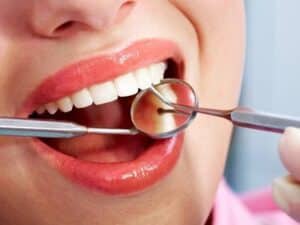
September 15, 2022
Do you find yourself hesitating to smile because of a cracked or chipped tooth? Or do you have some discoloration on your teeth that makes it uncomfortable for you to show off your smile to other people?
You’ve come to the right place! Knowing your interest in dental bonding, this article is going to give you a breakdown of what this treatment is all about, who it’s for, how it’s performed, and much more necessary information. Keep reading ahead to learn about Dental bonding in Marysville!
What is Dental Bonding?
Dental bonding is a type of cosmetic dental procedure wherein the dentist bonds a tooth-colored composite resin material onto the cracked, chipped, or discolored tooth. With the help of special light, The resin is applied and hardened to restore or enhance one’s smile.
The procedure is done in order to repair dental imperfections such as any chips or cracks or alter the color and shape of the tooth. Additionally, it can also get rid of any minor gaps in one’s teeth.
Unlike other cosmetic dental procedures like veneers, bonding is reversible.
Types of Dental Bonding
Dental bonding can be classified into two kinds: adhesive and direct composite bonding. These are the most common types of bonding, and both are different in their own ways. Depending on the situation of your teeth and other circumstances, the dentist will recommend you the appropriate treatment for your teeth.
Learn the difference between adhesive bonding and direct composite bonding below.
Adhesive bonding
Adhesive bonding is a type of dental bonding wherein the dentist uses an etchant or a bonding agent in order to attach a dental restoration (porcelain, crown, bridge, or veneer) to the tooth. This procedure also uses a strong curing light to secure the bond.
This type of bonding is a bit more intricate and goes through a lot of steps compared to direct composite bonding. Your tooth is etched in order for the dental restoration material to stick better. After the etching process, a bonding agent is added so the material can adhere, and the dentist will use a curing light to be able to strengthen the bonding agent and adhesive.
Direct composite bonding
Direct composite bonding is less complicated than adhesive bonding. This time, dentists use composites that are tooth-colored and fill in cracks, chips, and even cavities with them. The procedure begins with the dentist directly applying the composite resin material to the targeted tooth and shaping it so that it blends naturally with the rest of the teeth. Shortly after, The process is then completed by applying the curing light.
This kind of bonding is actually very simple, and it often only requires one visit to the dentist. Direct composite bonding does not require any form of mold-taking or temporaries since there’s no need for a lot of preparation.

Who Needs Dental Bonding?
Dental bonding is a procedure that can be done on anyone who wants to have their imperfections concealed. It does not require extensive consultation, but it would still be best to have a discussion with your dentist about this so that you know exactly how the procedure works and which type of bonding treatment would work best for the condition of your teeth.
You should consider getting bonding treatment done if you:
- Have some space in between your teeth that you want to close
- Have worn-down teeth
- Want to restore your chipped or cracked tooth
- Have some discoloration on your teeth
- Want to have your teeth reshaped
- Have any cavities
How is Dental Bonding Performed?
Depending on the kind of bonding you’re getting, this cosmetic procedure is done in different ways, but in general, the dentist uses a resin to alter the shape of your teeth or disguise any imperfections. A curing light is essential for dental bonding regardless of which one you get because it hardens the resin to make the restorative material sturdier and more long-lasting.
You don’t need to prepare a lot on the day of the treatment, and there’s no anesthesia required. Dental bonding is relatively painless that you won’t even need pain relievers after the procedure.
What to Do After Dental Bonding
Compared to other kinds of cosmetic dentistry, dental bonding can be chipped and stained a bit easier, so it’s important to do your duty and be responsible by taking good care of them.
The best ways to preserve your teeth after the bonding procedure is by following proper oral hygiene, such as brushing your teeth twice daily, flossing at least once a day, cutting back on coffee, tea, and wine, and refraining from smoking. You also want to avoid biting your nails or chewing hard objects such as pencils or carrots.
Take an immediate visit to the dentist once you notice your teeth have sharp edges.
Advantages of Dental Bonding
Dental bonding is relatively affordable and can fit in most budgets. There are instances wherein insurance can cover a portion of the costs, especially if you’re getting it for structural reasons. Another advantage is that the procedure is pretty simple and won’t require you to spend the entire day at the dentist’s office in Marysville. Additionally, unless you are having a decaying tooth treated, anaesthesia is not necessary.
Disadvantages of Dental Bonding
Due to its process, the material used in dental bonding is not as sturdy as compared to the ones used for veneers or crowns. Another disadvantage of bonds is that they may become soiled with time, particularly if the wearer smokes or drinks a lot of coffee
Conclusion
Dental bonding is a popular treatment because of how quickly it can restore the condition of one’s teeth. Now that you know more about this treatment and are interested in getting one yourself, here at Dentistry at Marysville, you’re in the hands of friendly and reliable dentists who care about your oral health. Schedule a consultation for more inquiries and concerns, feel free to contact us today!
New Patient Specials
New patients to Dentistry Marysville are invited to take advantage of one of our first-time visitor specials.
To claim the offer, screenshot or print the coupon and show it at your initial appointment.
$149 New Patient Special Plus $100 Off Your Second Office Visit*
*New patients only. A $369 value. Cannot be combined with other offers or insurance.
10% Off Cash Discount on All Dental Services*
*Cannot be combined with other offers or insurance.
$149 New Patient Special Plus Professional Teeth Whitening for ONLY $350*
*New patients only. Cannot be combined with other offers or insurance.
$89 New Patient Special* Limited Exam & X-rays
*New Patients Only. Cannot be combined with other offers or insurance.

